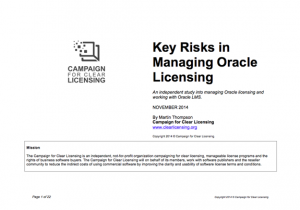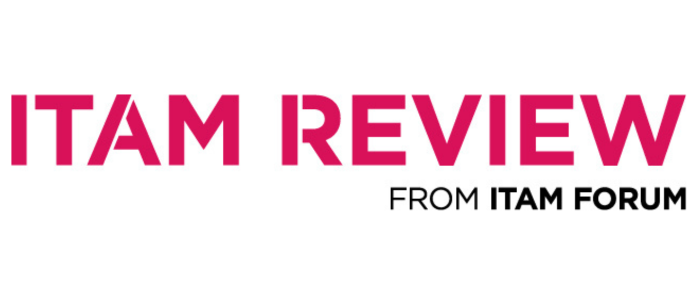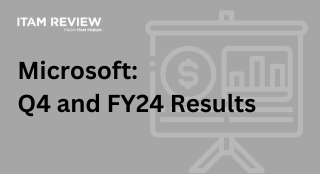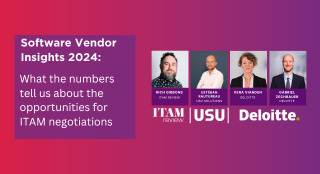92% of customers say that Oracle does not clearly communicate licensing changes
If you need help managing your Oracle Licensing and the associated risks why not attend one of our Oracle Seminars in Berlin or New York
Campaign for Clear Licensing White Paper: “Key risks in managing Oracle Licensing”

Download – “Key risks in managing Oracle Licensing” White Paper (PDF, 22 Pages, 1MB) NO REGISTRATION REQUIRED
The Campaign for Clear Licensing (CCL) has today announced the publication of its first major review into Oracle’s licensing and auditing practices.
The report Key Risks in Managing Oracle Licensing, states that Oracle’s approach to licensing and auditing has resulted in customer relationships that are predominantly “hostile and filled with deep-rooted mistrust.”
The Campaign for Clear Licensing (CCL) prepared the report so that its members were better informed when dealing with Oracle, and to form the basis of a constructive dialogue with Oracle so that positive change for both the customer and Oracle could result. The report builds on quantitative and qualitative research from three sources;
- A survey of over 100 Oracle customers worldwide
- A roundtable discussion between Oracle and its customers, which included representatives from three countries, public and private sector organisations and including six FTSE 100 companies
- An open discussion with the Oracle LMS team at Oracle Reading, UK
All of those who participated in the report are responsible for Oracle licensing in their organisation. They are therefore experienced software buyers and are used to negotiating with many software vendors, so the opinions they gave are based on a deep understanding of the broader software licensing landscape and how Oracle compares to it. The specific job titles of those surveyed were software asset managers, IT asset managers, software licensing specialists or IT procurement professionals. Oracle was also given the opportunity to respond to the report’s findings prior to publication, with their responses included throughout section two of the report.
According to the survey, Oracle’s audit requests are often unclear and difficult to respond to, Oracle’s own License Management Services organisation (LMS) is largely unhelpful to customers during an audit, and the company’s licensing changes are often poorly communicated (to the extent that in some instances Oracle’s own sales teams and LMS are often found to be working with out-of-date licensing information).
Key statistics include:
- 92% of customers say that Oracle does not clearly communicate licensing changes (most respondents felt that their enquiries often result in a failure to secure accurate information from Oracle, as Oracle is not certain whom should be able to answer the queries satisfactorily)
- 88% of organisations disagreed or strongly disagreed with the statement that “Oracle audit requests are clear and easy to manage / respond to”
- Only 22% agreed that LMS was helpful during an audit, contract renewal or negotiation process
Three Key Issues
While CCL’s research uncovered numerous challenges when it comes to dealing with Oracle licensing, the CCL has summarised the customer experience by the following three themes:
- The customer does not feel autonomous. They are dependent on Oracle for decision-making
- Messages from Oracle are inconsistent, which undermines its customers’ efforts to stay compliant and keeps them on the back foot when it comes to licensing negotiations (which plays to Oracle’s advantage)
- Oracle moves the goal posts to suit their revenue goals rather than customer requirements
“Based on our research and conversations over the last six months, we have found that customers’ relationships with Oracle are hostile and filled with deep-rooted mistrust,” comments Martin Thompson, founder of the Campaign for Clear Licensing and author of the report. “So entrenched is this feeling of mistrust that some organizations were fearful of speaking to us in case of any audit repercussions.”
“Whilst every organisation entering into contracts must be accountable for the agreements they purchase, a disproportionate amount of risk and management overhead appears to be placed on the customer by Oracle. Similarly, many customers have not invested, or are not capable of investing, sufficient resource to manage their Oracle estate, or are aware of the investment in management overhead that they will require prior to engaging with Oracle. On the whole, the customers we surveyed appear to have an arms length, impoverished relationship with Oracle.”
CALL TO ACTION FOR ORACLE
The Campaign for Clear Licensing, acting on behalf of its members and those who participated in this study, recommends that Oracle focuses on addressing the following issues:
- One voice please – organisations want clarity over Oracle license management from one voice. They don’t want to be passed around between departments who don’t communicate with each other.
- Knowledgebase – Oracle needs to invest in a well-organized knowledgebase to educate its customers.
- Communicate – Oracle is not being invited to participate in key business conversations because of mistrust. Oracle needs to step up conversations and provide clarity to regain trust.
- Re-engineer risk – As more organizations mature in their governance processes, more will shy away from Oracle as an unnecessary burden to manage. Oracle needs to engineer its products and license programs to reduce unnecessary risk. The focus of control needs to be placed in the hands of the business not developers.
- Software Asset Management Evangelism – Oracle needs to help educate its customers to assign appropriate resource for managing software and proactively assist with licensing training and management practices around Oracle software.
- Audit Clarity – Oracle needs to be crystal clear with audit activity and adopt the Campaign for Clear Licensing code of conduct
- Strategic Focus – Customer satisfaction, relationship strength and strategic value should replace audit revenue as a key performance indicator.
Mark Flynn, CEO of the Campaign for Clear Licensing concludes:
“One of the Campaign’s stated roles is to meet with software publishers in order to improve dialogue with their customers and ultimately improve the experience for everyone involved. This is our first thorough review of a vendor’s approach to licensing for our members, and while the results might not surprise anyone who deals with Oracle software licensing on a day-to-day basis, the deeply negative experience of its customers should serve as a wake up call to Oracle. We have been impressed with Oracle’s willingness to work with the Campaign and welcome its openness in forming this meaningful dialogue with its users. Change will take time, but we hope that this exercise will result in a more positive experience for Oracle customers in the future.”
Download and Share
- Free to download and share, no registration required.
- 22 Pages, 1MB
- Download Link: https://itassetmanagement.net/wp-content/uploads/2014/10/Key-Risks-in-Managing-Oracle-Licensing-November-2014.pdf
CALL TO ACTION FOR ITAM REVIEW READERS
- COMMENT: What have we missed? Do you agree with our assessment? Please leave a comment below or contact us.
- SHARE: Please share this document with your peers, business partners and customers.
- ENGAGE: Discuss the topics in this White Paper at a FREE Oracle Seminar on the 21st November, in London (80% full as of today).
Thanks to everyone that helped compile this report. See you on the 21st November to continue the conversation.
Can’t find what you’re looking for?
More from ITAM News & Analysis
-
AI Is Here—And It’s Your Best ITAM Ally, Not Your Replacement
I’ve been asked several times over the last couple of years how AI will impact ITAM and how it will impact jobs. Well, who knows what will actually happen in the future, but my guestimate is ... -
FinOps for SaaS: A Step in the Right Direction, But Will It Work?
The FinOps Foundation is making a bold attempt to get better visibility and control of SaaS applications. This has been driven in part because the vast majority of FinOps teams also manage SaaS to some extent. ... -
The Forrester Wave SAM Solutions Report (Q1 2025)
Forrester, the US based research firm, recently released its latest SAM Solutions Wave report for Q1 2025. The report reflects its research and analysis of nine SAM providers it considers to matter the most, and scores ...
Podcast
ITAM training
Similar Posts
-
The High Cost of Oracle Java: Managing Expenses and Operational Efficiency
For businesses reliant on Java, Oracle’s licensing model presents a formidable challenge. Once a freely available technology, Java has evolved into a costly necessity for enterprises, with licensing changes leading to widespread financial and operational concerns. ... -
Microsoft: June 2024 Q4 and FY24 Results
Microsoft Corp recently announced its June 2024 Q4 and FY24 end-of-year results. Looking at the overall results across all sectors, the total revenue for Microsoft increased by 16% to a total of $245.1 billion with a ... -
Adobe Sued by FTC for Unfair Selling Practices
The Federal Trade Commission has announced legal proceedings against Adobe and two of its senior executives for what it claims is misleading and complex terms and activities related to cancellation of software subscriptions. Section 8403 of ... -
Software Vendor Insights: What do the numbers tell us about the opportunities for ITAM negotiations?
What software vendor insights can be gained from the latest financial results from Amazon, Google, Broadcom, Salesforce, IBM and SAP? An important part of ITAM is paying close attention to the health of the companies we ...




